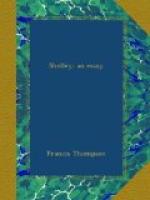Shelley’s life frequently exhibits in him the magnified child. It is seen in his fondness for apparently futile amusements, such as the sailing of paper boats. This was, in the truest sense of the word, child-like; not, as it is frequently called and considered, childish. That is to say, it was not a mindless triviality, but the genuine child’s power of investing little things with imaginative interest; the same power, though differently devoted, which produced much of his poetry. Very possibly in the paper boat he saw the magic bark of Laon and Cythna, or
That
thinnest boat
In which the mother of the months
is borne
By ebbing night into her western
cave.
In fact, if you mark how favourite an idea, under varying forms, is this in his verse, you will perceive that all the charmed boats which glide down the stream of his poetry are but glorified resurrections of the little paper argosies which trembled down the Isis.
And the child appeared no less often in Shelley the philosopher than in Shelley the idler. It is seen in his repellent no less than in his amiable weaknesses; in the unteachable folly of a love that made its goal its starting-point, and firmly expected spiritual rest from each new divinity, though it had found none from the divinities antecedent. For we are clear that this was no mere straying of sensual appetite, but a straying, strange and deplorable, of the spirit; that (contrary to what Mr. Coventry Patmore has said) he left a woman not because he was tired of her arms, but because he was tired of her soul. When he found Mary Shelley wanting, he seems to have fallen into the mistake of Wordsworth, who complained in a charming piece of unreasonableness that his wife’s love, which had been a fountain, was now only a well:
Such change, and at the very door
Of my fond heart, hath made me poor.
Wordsworth probably learned, what Shelley was incapable of learning, that love can never permanently be a fountain. A living poet, in an article {6} which you almost fear to breathe upon lest you should flutter some of the frail pastel-like bloom, has said the thing: “Love itself has tidal moments, lapses and flows due to the metrical rule of the interior heart.” Elementary reason should proclaim this true. Love is an affection, its display an emotion: love is the air, its display is the wind. An affection may be constant; an emotion can no more be constant than the wind can constantly blow. All, therefore, that a man can reasonably ask of his wife is that her love should be indeed a well. A well; but a Bethesda-well, into which from time to time the angel of tenderness descends to trouble the waters for the healing of the beloved. Such a love Shelley’s second wife appears unquestionably to have given him. Nay, she was content that he should veer while she remained true; she companioned him intellectually, shared his views, entered into




